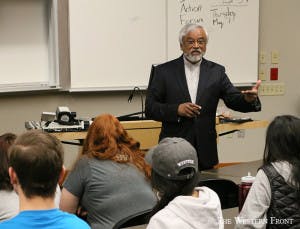
After a few cleansing breaths and a recitation of the first chapter of the Quran, a discussion on how to confront Islamophobia began.
The event “Confronting Islamophobia” featured Jamal Rahman, a Muslim Sufi minister from Seattle’s Interfaith Community Sanctuary, and was organized through a joint effort by Western’s Muslim Student Association and the Social Issues Resource Center for the annual Islam Awareness Week.
This is the first year Rahman has spoken on campus on the topic of Islamophobia.
From Monday, May 4, through Friday, May 8, the Muslim Student Association held four events for their Islam Awareness Week and will end with a dinner in the Viking Union Multi-Purpose Room on Friday.
The Muslim Student Association reached out to Rahman after watching a video of him with his group, the Interfaith Amigos. The group has written books, been featured in a TEDx talk and in The New York Times.
Rahman has been collaborating with Interfaith Amigos members Rabbi Ted Falcon and Pastor Don Mackenzie from the Seattle area since 9/11 to help set up guidelines to conduct interfaith dialogue.
According to Rahman’s personal website, the group’s work “comprises a dialogue of the mind, the heart, and the hands, encouraging greater understanding, compassion, and social action in the world.”
Fareeha Nasir, a senior at Western and a Muslim, was interested to see what kind of opinions the speaker would bring and said it is important for schools to host these kind of events.
Nasir said the Muslim Student Association has been putting on events all week.
“This particular day is about Islamophobia and I receive a lot of that from the media and from life in general."
Nasir believes the atmosphere on campus is a work in progress. She said there have been a lot of surface-level progress where other religiously or culturally affiliated clubs are holding similar events, she said.
The focus of Rahman’s discussion on Wednesday, May 6, was on Islamophobia and ways to overcome differences. Islamophobia is a term that has been floating around for the last few years, Rahman said.
Israel Rios, the outreach coordinator for the Social Issues Resource Center, said Islamophobia is an issue that is highly ingrained in American culture, especially since the events of 9/11.
“It’s something that we don’t really talk about,” Rios said. “It’s something that a lot of people think about, but we don’t have these kind of events where people can come out and learn about each other and the issues.”
Rahman gave insight on Mahatma Gandhi’s idea that one of the first steps to overcoming polarization is that there has to be an appreciative understanding of another person’s religion.
“For me as a Muslim, this is a majority Christian country, it is my duty to have an appreciative understanding of Christianity,” he said. “It is not enough to say that I am open-minded or not prejudiced.”
The key way to overcome polarization is to come to know each other, he said. This means, he said, that people must begin to connect on a human level by getting to know others without letting prejudice get in the way. It then becomes difficult to demonize and dehumanize the other, Rahman said.
During the event, Rahman had audience members split into groups where one person at a time would answer a question designed to help them connect to one another. One of the questions that the audience had to reflect on was whether there have been conflicts between family members or friends over religious or cultural beliefs.
This group activity was modeled after Amazing Faiths, a program designed to get people of different religious beliefs talking and listening to each other.
The event was engaging, Rios said.
“The interactivity was a good thing because sometimes you need something to wake you up while listening, but it also just engages you further into the conversation,” Rios said.
A member of the audience asked Rahman for advice on how to talk to those who aren’t open to discussing difficult topics.
“Always say yes,” he responded. “We aren’t trying to change them but are trying to connect with them.”
As the event came to a close, Rahman asked for audience participation one last time. He explained that in his culture, they like to end most meetings or events with this certain phrase. He then had members join him in reciting “om shanti om, I am a peaceful soul.”





